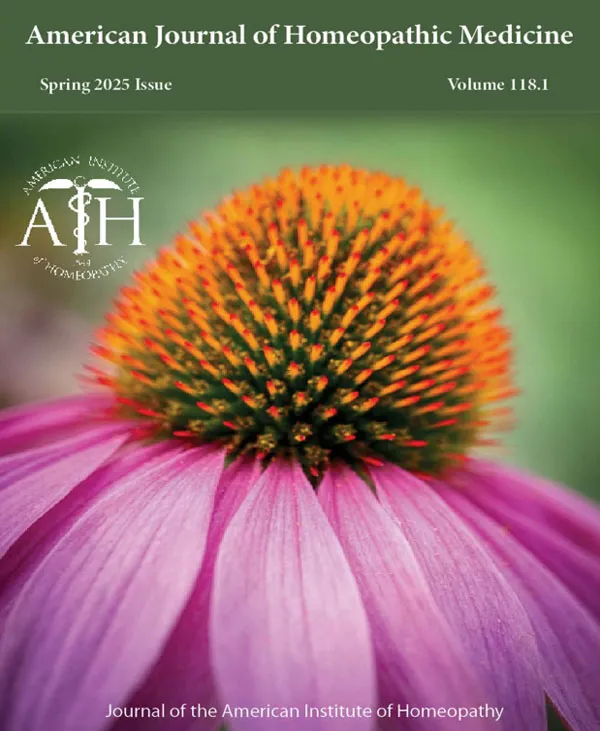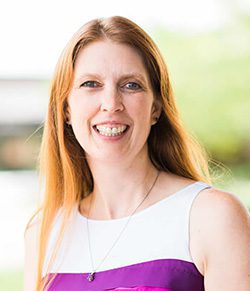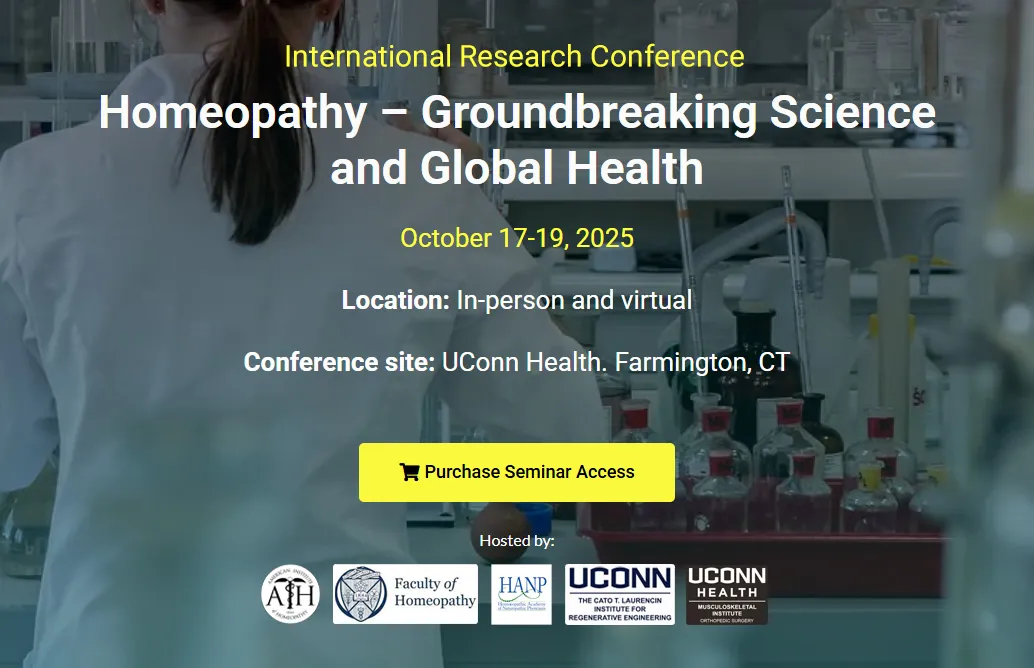
President’s Message: The Mission of the AIH
My esteemed colleagues, supporters of homeopathy and even future practitioners of homeopathy. I want to personally thank Dr. Alex Bekker and the long list of giants upon whose shoulders I now stand. It is a great honor and great responsibility to become, roughly, the 143rd president of the American Institute of Homeopathy. Why do I say roughly, because I have not yet had my hands on the journals from 1928 to 1946, to that point in time, with the exception of the Civil War and one other time, there was a new President every year. Presidential terms did not begin to lengthen until the late 1960s. There are a few people I must personally thank and acknowledge, because without them I would not be the person I am today. A dear family friend, Margie Echols, who introduced our family to homeopathy and technically was my very first teacher. It is because of her that everyone in my path from the age of 7 or 8 was given Arnica, Hypericum, Ledum or Calendula should they need it. I also wish to thank Nick Nossaman and his gentle encouragement since childhood, Karl Robinson, whose scholarship took me to my first ever NCH summer school where I met Andre Saine, and whose mentorship has kept me pointed toward pure homeopathy for the past 25 years; Stephen Messer, who provided me the brilliant clinical experience to put all my “book smarts” into play; and Kim Elia, for modeling such great charisma in lecturing and connecting the community together while reminding us of the old adage and its relevance to homeopathy today—“a rising tide lifts all boats.” Of course, he did not coin that line, but it is his voice I hear when it is said. And I must thank my parents for their steadfast encouragement, as well as my beloved husband Greg who has been by my side through every hill and every valley. There are so many more who have played an integral part in my life and I thank you all.
As I reflect on the American Institute of Homeopathy, I notice where we have been, where we are now, and where we are to go in the future. I am sure that homeopathy is the great medicine of the past, present and future. The 2nd Article of the Constitution of the AIH states the object of this Institution shall be the improvement of the science of medicine. In the minutes of the first session a powerful declaration regarding the essential purposes of the institute was made:
- The reformation and augmentation of the Materia Medica.
- The restraining of physicians from pretending to be competent to practice Homeopathy who have not studied it in a careful and skillful manner.
Since this was written in 1844 many things have happened. The Homoepathic Medical College of Pennsylvania was formed, where Constantine Hering and Adolphe Lippe trained some of the most successful homeopathic physicians of the time. There were over 20 homeopathic schools formed between 1845 and 1910. Carrol Dunham gave his famous speech in 1870 before the AIH entitled “Liberty of Medical Opinion and Action; a Vital Necessity and a Great Responsibility.” This opened the doors of membership in the AIH to the eclectic provider with a goal of inspiring them to learn and practice pure Hahnemannian homeopathy. By the 1890s, eight percent of physicians in the United States were practicing homeopathy and most were members of the AIH. In 1910, it was estimated that there were 15,000 practicing homeopaths in the U.S. Most of the schools were privately funded. This was great, until it was not. The quality of homeopathic training began to decline as funding changed, for reasons that are beyond the scope of this brief message. The materia medica was carefully documented in great encyclopedias such as Hering’s Guiding Symptoms of our Materia Medica and T. F. Allen’s Encyclopedia of Pure Materia Medica. In 1897, the AIH published the first ever version of the Homeopathic Pharmacopeia of the United States (HPUS). This important text began the process of both the standardization of origination materials used in homeopathic medicines and the establishment of proper manufacturing methods of those medicines, providing the framework for homeopathic medicines to ultimately be recognized as legal drugs in the 1938 Food Drug and Cosmetic Act.
The HPUS became part of the law that laid the foundation for guidelines that the FDA would employ to regulate homeopathic medicine in this country. Of course, there have been many amendments to the guidelines. Some of these amendments excluded homeopathy; some of them ignored homeopathy, leaving interpretation up to the reader, and some of these amendments specifically mentioned homeopathy. This variation in amendments has brought us to quite the sticky place in 2024, a place where we must address this vital issue so that we can protect our homeopathic medicines. Much more has happened in the past 180 years, about which I will write periodically.
What exactly is the role of the AIH in the 21st century? The role is much the same as in 1844. We are to protect the science of medicine, which I am inclined to clarify as the science of homeopathic medicine. We are to continue to reform and augment our materia medica and we are to help protect access to homeopathic medicines. We are to inspire and build up leaders while encouraging physicians to carefully and skillfully study pure homeopathy. As leaders in our profession, we are to serve and inspire our colleagues and allies so that, together, we can protect this great medicine—homeopathy. Currently, the AIH is engaged in several efforts to achieve all of these goals.
First, let’s address the materia medica and protection of our medicines. Provings must continue to be encouraged in a proper systematic way following the principles that Hahnemann clearly described in his work – the Organon. It is our hope that wellconducted provings are published and, equally important, be added to the Homeopathic Pharmacopoeia of the United States (HPUS). Homeopathic medicines are classified as drugs in the United States; this means that the medicines we use should be listed there and it is our responsibility to protect our medicines by ensuring that they are so listed. The AIH is working together with all stakeholders within the manufacturing community to clarify guidelines that the FDA potentially could use in the evaluation of the manufacturing process, thus ensuring access to homeopathic medicines. This is a huge undertaking and will, without a doubt, require the assistance every person in our community. The AIH plans to encourage each stakeholder to do their part, so that together we can protect this great medicine.
Second, let’s address ways to inspire and build up leaders while encouraging physicians to carefully and skillfully study pure homeopathy. No matter where we are in our journey we must always be learning and studying homeopathy. Those of us who are physicians and have been awarded diplomate status or those of us who are quite experienced in homeopathic medicine, perhaps even having attained diplomate (DABHM) status have the responsibility of inspiring the next generation of homeopaths, encouraging them to study medicine, be it allopathic or naturopathic, so they can later practice homeopathy. To those of us who are practicing homeopathy but have not sought diplomate status because it would not affect their practice, we challenge you to do it anyway—perhaps not for yourself at all, but more for those who might look to you as an example, and for the government and its regulatory agencies which are watching us to determine if homeopathy is really as effective as we claim.
There are many of us who only practice homeopathy occasionally and infrequently. Great! I would encourage you to continue. I would so rather you give Cantharis for a urinary tract infection because of a protocol-based prescription than an antibiotic. I would rather you suggest a combination cold and flu remedy than give a strong conventional cough suppressant or steroid. However—I can speak for all of the AIH board—we encourage you to learn more. If you are amazed by what results you see now, just imagine what you will see when you have the next level of training! There are many young professional homeopaths who do not yet have a medical education. We all should be inspiring them to continue their medical education. There is nothing like a physician who has a solid medical foundation and is a strong homeopathic prescriber. These are like the specialists of the specialists. For those of us who are educators, the role must be to build a solid foundation in homeopathy. Medicine is a difficult field and this includes homeopathy. The only sure way of success is to have a solid foundation so that when the crises arise that will challenge and even intimidate us, we will have solid ground to stand on.
In closing, I firmly believe that this medicine, Homeopathy, when practiced correctly, is the most powerful system of medicine the world has known up to this time. I am also certain that homeopathy is the great medicine of the present and future. I invite you to reflect on the history of homeopathy in the United States, because when we know our history, our foundation, we will be better equipped to shepherd homeopathy into the future. It is an honor to serve you and this great profession, and I am excited to see what the future brings.
 Warm regards,
Warm regards,
Lisa Amerine, ND, DABHM
President, American Institute of Homeopathy
About the AJHM
The American Journal of Homeopathic Medicine (AJHM) is a peer-reviewed scientific journal, specifically intended to meet the needs of physicians involved in the specialty of homeopathy. The editor invites original manuscripts, feature articles, research reports, 'Homeopathic Grand Rounds' cases studies, abbreviated case reports for 'Clinical Snapshots,' seminar reports, and position papers that focus on homeopathy, as well as book reviews and letters to the editor. Click below to subscribe to the Journal.
Latest Issue of the AJHM

AJHM – Spring 2025
Volume 118 Number 1
Table of Contents
- Editorial: In this issue
- President’s Message: Our Guiding Precepts
- Homeopathic PuZZle?
- Alchemy, Spagyrics, and Homeopathy: Tracing the Threads of Energetic Medicine
- The Genius of Fluoricum acidum: Part One
- An Interesting Case of Kola
- Book Review: ‘Lessons in Pure Homeopathy, From the Writings of Hahnemann’s Best Student and Medicine’s Most Successful Practitioner, Adolph Lippe, MD’ – Edited & Annotated by A. Saine, ND
- Book Review: ‘Folkways and Homoeopathy: Our Ancestral Secret of Healing’ by Shailendra Ramchandra Vaishampayan


